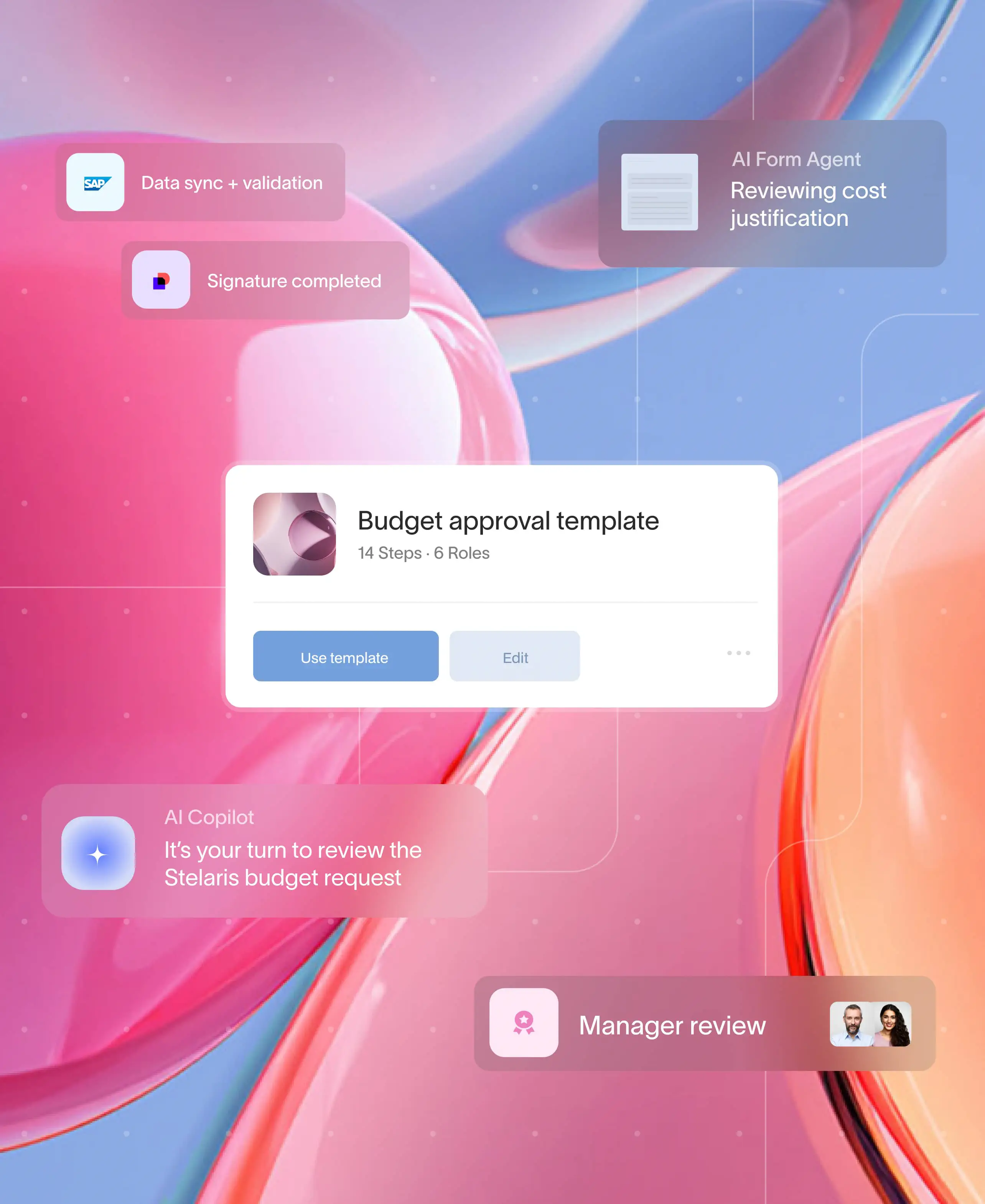
At a glance
Accounts payable workflows often slow down when teams rely on scattered emails and manual data entry. Automated workflow software eliminates repetitive steps so finance teams can focus on strategic analysis and vendor relationships instead of chasing invoice approvals.
Consistency and accuracy improve because every process follows standardized steps with clear accountability, reducing errors and missed payments.
Visibility increases with real-time tracking, helping teams identify bottlenecks and maintain compliance with ease.
Scalable, efficient operations become achievable as automated workflows evolve with business growth—without adding more manual effort.
Modern AP workflows need orchestration
Accounts payable isn’t just a routine back-office task—it’s central to vendor satisfaction, financial accuracy, and compliance. Yet, 52% of organizations still rely on manual invoice processing, as noted in a study by Ardent Partners. This dependency introduces inefficiencies, slows down payments, and heightens compliance risks.
A single late payment can damage vendor trust, while missing documentation during audits can lead to penalties. Today’s finance leaders are seeking more than automation—they need orchestration. Accounts payable workflow software unites automation with structured human approvals, creating a balance of speed, control, and security.
Core AP workflows: where complexity builds
A typical accounts payable workflow includes invoice receipt, validation, matching, approvals, payment scheduling, and reconciliation. These steps sound simple but quickly become complex across multiple departments, geographies, and currencies.
Every missed handoff or unrecorded approval can create delays and compliance risks. Modern AP workflow software standardizes these processes while maintaining flexibility for exceptions and escalations.
Learn more about workflow orchestration and how structured automation ensures accountability at every stage.
Gaps in human-in-the-loop steps
While automation reduces repetitive work, human decision-making is still critical for exception handling, approvals, and clarifications. These are also where most bottlenecks occur:
- Managers delay approvals while traveling,
- Vendors resend invoices for updates,
- Audit trails become fragmented across email threads.
A mid-sized accounting firm experienced these challenges when relying solely on email for invoice approvals. A missed message often delayed vendor payments. After adopting structured AP workflows, the firm reduced turnaround time by 50% and improved visibility.
Shields Tax CPA achieved similar results using Moxo’s client portal to centralize invoice exchange and approvals. With role-based access, secure document sharing, and audit trails, they eliminated email backlogs and maintained consistent compliance documentation.
Exploring the solution landscape
ERP and AP modules
ERP platforms offer strong internal controls but often fall short on external collaboration. Vendors continue sending invoices through email, forcing finance teams to manually reconcile data across systems.
Standalone AP automation tools
These solutions excel at invoice capture, matching, and payment scheduling. However, they typically stop short of handling vendor communication or external approval processes.
Workflow orchestration platforms
Platforms like Moxo integrate automation and collaboration. They offer vendor portals, Magic Links for document uploads, and multi-level approvals—all within a secure, branded interface.
When evaluating options, consider this: would you invite your vendors to use the system? If not, it’s likely lacking external orchestration capabilities.
Patterns, pitfalls, and integrations
Common pitfalls
Many teams over-automate internal steps while ignoring vendor collaboration. Others overlook security, using unencrypted channels for document exchange, or choose tools that don’t integrate with their ERP systems—causing double entry and data silos.
Success patterns
Organizations that achieve measurable ROI follow consistent patterns:
- They adopt centralized vendor portals for visibility.
- They design role-based approvals for compliance.
- They integrate workflows with their ERP to ensure data consistency.
According to a Gartner report, companies with integrated AP workflows see 30% faster cycle times and stronger vendor satisfaction levels.
Decision checklist: evaluating accounts payable workflow software
How Moxo helps
Modern AP workflow software should unify invoice intake, validation, approvals, and reporting—not scatter them across multiple tools. Moxo delivers this through an integrated, secure workspace purpose-built for finance teams.
With Moxo’s workflow builder, teams can design step-by-step approval flows with clear ownership, escalation paths, and SLAs. Workflow automation handles routing, reminders, and reconciliations automatically.
Integrations connect Moxo to existing ERPs, CRMs, and payment systems, ensuring real-time data sync and zero duplicate entry. Vendor portals centralize collaboration, while performance dashboards track KPIs like cycle time, approval lag, and exception rates.
Backed by SOC 2-compliant security and audit trails, Moxo gives finance leaders a complete, compliant AP automation layer that scales with business growth.
Automated workflows evolve with your business growth
Accounts payable workflow software is no longer optional—it’s the foundation for accuracy, speed, and trust in vendor relationships. When workflows are orchestrated, teams spend less time chasing approvals and more time driving financial insight.
Moxo helps finance leaders gain visibility and control without adding complexity. With secure portals, real-time notifications, and ERP integrations, it ensures every approval is documented, every payment traceable, and every vendor interaction compliant.
Ready to modernize your AP operations? Book a demo with Moxo and experience how streamlined orchestration can unlock measurable ROI.
FAQs
What is accounts payable workflow software?
It’s a platform that automates invoice processing and orchestrates vendor collaboration, approvals, and payments in a single interface.
How does it differ from AP automation tools?
Automation tools handle repetitive tasks. Workflow software adds external orchestration, secure collaboration, and visibility across all stakeholders.
How does Moxo integrate with ERP systems?
Moxo integrates with ERP and accounting software such as SAP, NetSuite, and QuickBooks, syncing data securely and eliminating duplicate entries.
What ROI can I expect from AP workflow software?
Organizations see 40–60% faster approvals, improved compliance readiness, and reduced manual communication with vendors.
Is Moxo suitable for both small businesses and large enterprises?
Yes. Moxo scales to meet the needs of small businesses and enterprises, offering flexible configurations for any team size.






